TOP STORY
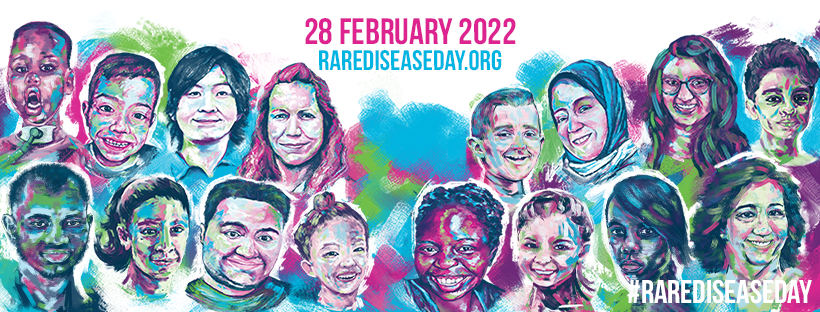
Thank you for reading this latest issue of NA News. We are pleased to share this 38th issue on a very special day, Rare Disease Day 2022.

Thank you for reading this latest issue of NA News. We are pleased to share this 38th issue on a very special day, Rare Disease Day 2022. Created in 2008 , Rare Disease Day seeks to raise awareness of the needs of patients around the world with rare diseases. Per its website, the goal is "to work towards equity in social opportunity, healthcare, and access to diagnosis and therapies for people living with a rare disease." Rare Disease Day is coordinated by EURORDIS with over 65 patient organization partners and is observed every year on 28 February (or 29 in leap years). Learn more at the Rare Disease Day website at https://www.rarediseaseday.org/
As we celebrate Rare Disease Day, please find this issue chock full of news from patients, timely updates on research, communication tips for NA patients from a Speech Therapist, and an important "save the date" for the next VPS13 Zoom Forum. We also include the results of a recent survey of patients, the inaugural annual report for NA-USA, and a call for new trustees for NA Advocacy and new board members for NA-USA. Go ahead. Take a peek.
 |
|
 |  |
Survey Says...
 Candi DiMarzio of the Neuroacanthocytosis Advocacy USA board of directors reports on a recent survey she conducted of NA patients. Candi DiMarzio of the Neuroacanthocytosis Advocacy USA board of directors reports on a recent survey she conducted of NA patients.
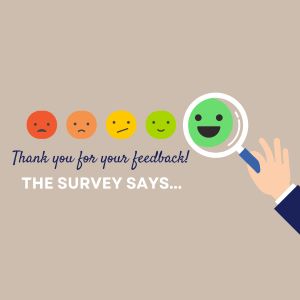 On behalf of Neuroacanthocytosis Advocacy-USA, INC we conducted a survey of patients for whom contact information was available. We received responses from eight patients from the US, Canada, and other countries. On behalf of Neuroacanthocytosis Advocacy-USA, INC we conducted a survey of patients for whom contact information was available. We received responses from eight patients from the US, Canada, and other countries.
The first question asked was if the patient had Chorea Acanthocytosis (VPS13A, formerly known as ChAc) or McLeod syndrome. Of the eight responses, five patients had VPS13A and three had McLeod syndrome.
We were interested in seeing an average age of onset of symptoms. Ages ranged from the teens to mid-fifties. Initial symptoms varied, and included throat noises, clumsiness, seizures, anxiety, elevated CPKS, biting of the tongue, falls and auto accidents. Patient diagnosis was by a special blood test or DNA testing.
Another question asked was whether the patient was currently doing Speech, Physical or Occupational Therapy. Four people were currently doing Speech Therapy, three were doing Physical Therapy and one was doing Occupational Therapy. Therapy helped patients in a variety of ways. One patient reported that Speech Therapy helped with speaking on an iPad. Another stated that it helped with volume and articulation. The patient doing Occupational Therapy was introduced to helpful aids such as a plate guard.
Another question asked was what normal daily routines they could still do pre-diagnosis. One was very independent; another could still brush their own teeth and use a computer. A few could still walk, eat, and shower. Some of the patients could no longer be left alone.
Abnormal behaviors and compulsions were varied. Two patients reported no issues, but others shared that they experienced short term memory loss, throat noises, involuntary movements, OCD, and walking as if drunk.
Eating assistance was another question we were interested in asking. Two patients were tube-fed, one could eat soft pureed food with full assistance while sitting up. Another needed assistance in cutting their food and drank liquids through a straw. A few patients continue to dine on regular table food but got food all over them and the floor.
We also inquired about the use of medical equipment. One patient was on a ventilator, and another used a U-verse walker especially made for people with motion disorders. One patient used a wheelchair, special cups and forks, and a shower chair.
We wanted to know what a patient does in their day-to-day routines that might be of help to others if shared. Two people took high doses of vitamin B12, B1, and B6. A few of the other patients felt that special cups, straws, forks, massages, peppermint oil on the back of the neck, and a plate guard to keep food on their plate were helpful. Another patient uses a rolled-up piece of foam in his hand to keep his hand from closing tight. A ramp was another helpful solution for a patient.
Only two of the eight patients currently use a C-Pap machine.
We asked the patients if there was anything they would like to share regarding their experience with these rare diseases. Responses included: “laugh every day” and “be around people who love, care and support you.” One patient enjoys doing jigsaw puzzles. She uses a pencil with sticky putty on the end to pick up the pieces. One patient uses a long stick with grippers to pick things up off the floor. Another patient started eating spinach daily and reports positive results with body balance, walking and speech.
Thank you to all the patients that replied to the survey.
 |  |
Casting the Leadership Net
 Patient Advocacy Organizations Seek Additional Trustees. Are you an advocate for all things neuroacanthocytosis? Do you have the time and gifts needed to serve a patient advocacy organization? If so, then read on... Patient Advocacy Organizations Seek Additional Trustees. Are you an advocate for all things neuroacanthocytosis? Do you have the time and gifts needed to serve a patient advocacy organization? If so, then read on...
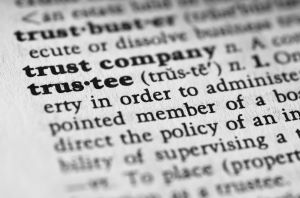 The Advocacy for Neuroacanthocytosis Patients, also known as NA Advocacy, calls them “trustees;” Neuroacanthocytosis Advocacy USA, also known as NA-USA, calls them “directors” or “board members.” Whatever the name used, these important individuals work together to accomplish the goals of their respective organizations. Both NA Advocacy, based in London, and NA-USA based in Florida, are looking for a few good individuals with a heart for finding a cure for VPS13A and McLeod syndrome and for supporting individuals with these disorders, and their families. The Advocacy for Neuroacanthocytosis Patients, also known as NA Advocacy, calls them “trustees;” Neuroacanthocytosis Advocacy USA, also known as NA-USA, calls them “directors” or “board members.” Whatever the name used, these important individuals work together to accomplish the goals of their respective organizations. Both NA Advocacy, based in London, and NA-USA based in Florida, are looking for a few good individuals with a heart for finding a cure for VPS13A and McLeod syndrome and for supporting individuals with these disorders, and their families.
At its most basic, to truly be an effective nonprofit trustee or board member requires having good character, a strong commitment to the cause, the gift of time, and a willingness to use personal and professional resources to advance the organization's mission. If you would like to learn more about the role of a trustee/board member with NA Advocacy, please contact Ginger Irvine at ginger@naadvocacy.org. For information on NA-USA, please contact Susan Wagner at susan@naadvocacyusa.org or Joy Willard-Williford at joy@naadvocacyusa.org.
 |  |
RESEARCH UPDATE
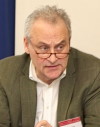 Dr. Adrian Danek shares news of recent virtual communication measures and announces the next virtual VPS13 forum to be held on March 28, 2022. Dr. Adrian Danek shares news of recent virtual communication measures and announces the next virtual VPS13 forum to be held on March 28, 2022.
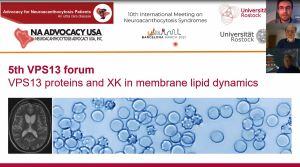 Success of the Forum Format to Keep the VPS13 and XK Conversation Going, Dr. Adrian Danek Success of the Forum Format to Keep the VPS13 and XK Conversation Going, Dr. Adrian Danek
As the whole world has switched to virtual communication during the pandemic, so have we - starting with a sort of family gathering, the NA Christmas party, on December 7, 2020. The follow-up patient question and answer session on January 18, 2021, but even more so, the 10th International Neuroacanthocytosis Symposium organized by our colleagues in Barcelona, have convincingly demonstrated the use of the once exotic formats.
Up to now, we have organized five sessions of the “VPS13 forum” that aims to keep the global discussion going in these still taxing current times, starting on May 3, 2021 with the topic of the “WIPI4/WDR45/atg2a molecular complex” which shares manifold aspects of the VPS13 molecule complexes and could not be fully covered at the Barcelona meeting. Prof. Proikas-Cezanne from Tübingen, Germany, spoke about basic molecular mechanisms, while Dr. Iankova from Munich, Germany covered the clinical aspects (BPAN/SENDA).
The most recent forum meeting on January 31, 2022, focused on the interplay of VPS13 proteins and XK in membrane lipid dynamics. Three international speakers (Profs. Pietro De Camilli, Yale; Aaron M Neiman, Stony Brook and Shigekazu Nagata, Osaka University) presented novel and often as yet unpublished data to a large international audience and Kevin Peikert, Rostock, convenor of the event, skillfully led the discussion. Basically, our previous assumption is now proven that the similarity between chorea-acanthocytosis and McLeod syndrome is based on the physical interaction of the two molecules VPS13A and XK. Some details have since been published (see e.g. doi:10.1073/pnas.2119286119 and doi:10.1038/s41594-021-00665-8), but others are as yet confidential and must be explored further. Adrian Danek and Kevin Peikert are to publish a summary of the three talks in the journal “Contact” once all presenters agree.
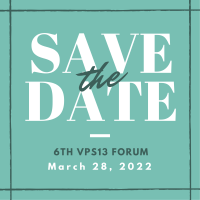 The 6th VPS13 forum will focus on “VPS13 disease insight from animal models” with the help of three speakers that will report on their findings with VPS13A and VPS13D in flies (Drosophila) and in mice, respectively. Profs. Baehrecke (University of Massachusetts), Sibon (University of Groningen), and de Franceschi (University of Verona) will present at a Zoom conference on March 28, 2022 from 7 to 9pm Central European Time. The 6th VPS13 forum will focus on “VPS13 disease insight from animal models” with the help of three speakers that will report on their findings with VPS13A and VPS13D in flies (Drosophila) and in mice, respectively. Profs. Baehrecke (University of Massachusetts), Sibon (University of Groningen), and de Franceschi (University of Verona) will present at a Zoom conference on March 28, 2022 from 7 to 9pm Central European Time.
ZOOM LOGIN
Meeting-ID: 924 7225 7380, Code: 982086
 |  |
Featured Researcher - Dr. Amber Tetlow
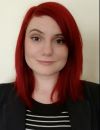 This issue we feature Dr. Amber Tetlow, a fairly new and welcome addition to the NA community. She is currently working on the Neuropathology of Neuroacanthocytosis project at the Icahn School of Medicine at Mount Sinai. This issue we feature Dr. Amber Tetlow, a fairly new and welcome addition to the NA community. She is currently working on the Neuropathology of Neuroacanthocytosis project at the Icahn School of Medicine at Mount Sinai.
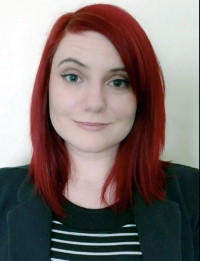 Amber completed her undergraduate degree in psychology with a minor in gerontology at the University of South Florida. During her undergraduate degree, she worked in a cognitive aging lab that focused on randomized controlled trials to study the efficacy of cognitive training programs among older adults with and without cognitive decline. Amber completed her undergraduate degree in psychology with a minor in gerontology at the University of South Florida. During her undergraduate degree, she worked in a cognitive aging lab that focused on randomized controlled trials to study the efficacy of cognitive training programs among older adults with and without cognitive decline.
She continued her education at the University of South Florida where she pursued her Ph.D. in Aging Sciences. During this time she was also a graduate visiting scholar at Michigan State University while conducting her dissertation research. Her dissertation focused on the effects of aging in animal models of both transgenic and viral models of tauopathy.
In March 2021 she joined Dr. John Crary’s Lab as a post-doctoral fellow at Icahn School of Medicine at Mount Sinai. Currently one of her major studies is Neuropathology of Neuroacanthocytosis Syndromes in collaboration with Dr. Ruth Walker. This project is aimed at gaining the largest collection of post-mortem tissues from those that were diagnosed with chorea acanthocytosis and McLeod syndrome.
The goal of this study is to provide the largest systematic analyses of these issues. The study is ongoing and this team is excited to share their findings once they can.
 |  |
Communication Tips for NA Patients
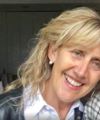 Speech Therapist Jacqueline McIntosh shares valuable communication tips for people with NA. Speech Therapist Jacqueline McIntosh shares valuable communication tips for people with NA.
 As social beings, we communicate for many reasons: to engage and socialise with others, to have a conversation, to negotiate, to problem solve, to explain, to get what we want, to ask questions, to sympathise, to encourage. Communication shows who we are and what believe and feel. We communicate differently with different people and again differently in different situations; we can be formal, full of fun, enquiring or instructive. We can discuss and gossip, debate and argue, share experiences and laugh. As social beings, we communicate for many reasons: to engage and socialise with others, to have a conversation, to negotiate, to problem solve, to explain, to get what we want, to ask questions, to sympathise, to encourage. Communication shows who we are and what believe and feel. We communicate differently with different people and again differently in different situations; we can be formal, full of fun, enquiring or instructive. We can discuss and gossip, debate and argue, share experiences and laugh.
To communicate well we think, talk, use gesture, use facial expression, write, read, email, text. When it is difficult to do any of these things it impacts on our ability to communicate. For example, if movement is challenging, it may impact on our effort to speak and use facial expression. Changes in cognition may affect thinking, planning what to say and expressing feelings.
It is not easy to know what someone is thinking or feeling if they can’t communicate. It is not easy to know how to relate with a person if they can’t tell you what they want.
Top Tips -- 1.Things to know:
Two or more people communicating have the best relationship and conversations when they know each other. It can be fun getting to know someone or if you already know them, remembering what they like and who they are. One person I know with speech difficulties told me to remember she liked chocolate and Mozart. Immediately I knew a little about her person. When a person is disabled there is more to know about their specific abilities, what care is best, how they want to be helped, preferences and which timings work the best.
2. Things that might help when talking is difficult:
- Being honest is the best policy.
- Speak slowly and recap if needed; allow time for a response.
- Ask yes or no questions; Give choices and number them so the answer can be one word.
- Repeat and double check you’ve got what the person is saying.
- Ask the person to be louder or to repeat.
- Ask for the most important part of the message (the key word).
- Ask the person to point or guess what she wants.
- Move on if you feel the thought is stuck and the person is very frustrated. Try again later.
- Alert others to the best way to communicate when you have found it.
- Try not to talk for the person.
3. Things to enhance better conversations:
Having conversations that are real life, informative and fun is important as daily life can be frustrating. People report that listening and engaging are good, even when they can’t participate easily or speak well.
- Sit at the same level, face each other.
- Encourage everyone to have a turn.
- Check the person is understanding.
- Give the person time to form a thought or add a comment.
- Increase the person’s involvement by making a comment, asking for an opinion.
- Use phrases to encourage involvement, e.g. ‘I noticed’, I saw…’ etc.
- Use visual pictures or texts to get comments from a hesitant speaker.
- Notice when someone has something to say.
 |  |
Mike Speaks Out
 Mike Koutis has VPS13A, what we used to call ChAc. He writes from Winnepeg, Manitoba, Canada about a new tool he is testing that is dramatically improving his ability to communicate with others. Mike Koutis has VPS13A, what we used to call ChAc. He writes from Winnepeg, Manitoba, Canada about a new tool he is testing that is dramatically improving his ability to communicate with others.
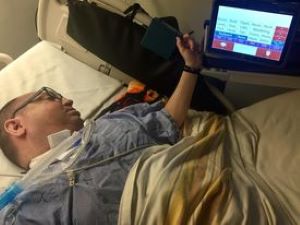 This month I have been using a new communication device on a trial basis. It’s a tablet-type device that attaches to my bedside table and I control it by hitting a clicker. I can prepare messages for staff and when they enter my room, they can either read it on my screen or I can hit a “speak” button and it will verbalize it. This month I have been using a new communication device on a trial basis. It’s a tablet-type device that attaches to my bedside table and I control it by hitting a clicker. I can prepare messages for staff and when they enter my room, they can either read it on my screen or I can hit a “speak” button and it will verbalize it.
This will be life-changing as staff were not understanding anything I was communicating on my letter board. I can also write notes independently now, and eventually, I will even be able to control my television with it. It has been amazing to be able to independently speak through using this device. I can finally express myself again!
Mike Koutis
Autologous Blood Donation to be Featured by Blood Bank
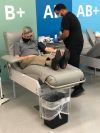 McLeod syndrome patients typically have the ultra-rare KX- blood type. Recently, to help promote the worldwide need for the blood type, Mark Williford was invited to help OneBlood in Orlando, Florida share the importance of making autologous donations. McLeod syndrome patients typically have the ultra-rare KX- blood type. Recently, to help promote the worldwide need for the blood type, Mark Williford was invited to help OneBlood in Orlando, Florida share the importance of making autologous donations.
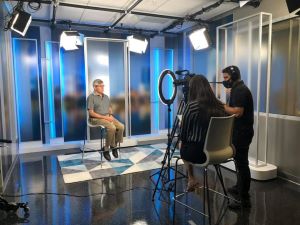 McLeod syndrome (MLS) patients have the very rare KX- blood type. In August, MLS patient Mark Williford of Melbourne, Florida traveled to Orlando to make an autologous donation in the event he should need blood some day. Mark will continue donating so that others may benefit. Mark himself is the beneficiary of donations from other generous MLS patients, having needed two units in 2015. McLeod syndrome (MLS) patients have the very rare KX- blood type. In August, MLS patient Mark Williford of Melbourne, Florida traveled to Orlando to make an autologous donation in the event he should need blood some day. Mark will continue donating so that others may benefit. Mark himself is the beneficiary of donations from other generous MLS patients, having needed two units in 2015.
While at the blood center, Mark was interviewed by the OneBlood media team. OneBlood is hoping to use this opportunity to promote donations from people with rare blood types.
Neuroacanthocytosis Advocacy USA Publishes First Annual Report
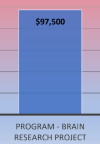 Neuroacanthocytosis Advocacy USA (NA-USA) was pleased to publish its very first annual report in January, highlighting accomplishments of its first full year of operations as a nonprofit. Neuroacanthocytosis Advocacy USA (NA-USA) was pleased to publish its very first annual report in January, highlighting accomplishments of its first full year of operations as a nonprofit.
|

|
ANNUAL REPORT 2021
|
The Board of Directors of Neuroacanthocytosis Advocacy USA, Inc.
Neuroacanthocytosis Advocacy USA, Inc. (NA-USA) is proud to present our Annual Report for 2021, our first full, active year of existence. We are grateful to our many supporters who made this year possible. Some highlights:
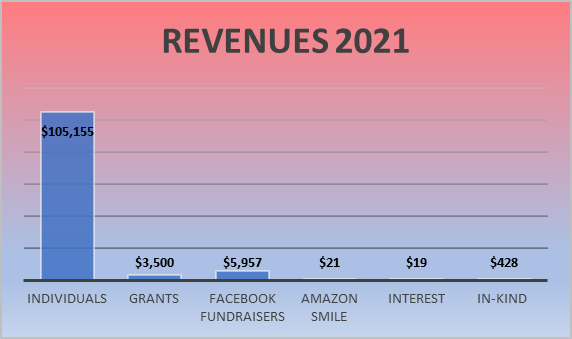 The focus this year was on our “Unlatch the Match” fundraising campaign – our first - where we successfully met the $1: $1 challenge of a $50,000 challenge gift. The focus this year was on our “Unlatch the Match” fundraising campaign – our first - where we successfully met the $1: $1 challenge of a $50,000 challenge gift.
Funds raised allowed us to fund Year-One of a brain research project called “Neuropathology of Neuroacanthocytosis” at the Icahn School of Medicine at Mount Sinai Hospital in New York City.
We were successfully awarded our very first grant in the amount of $3,500 from the Schwartz Foundation in Worcester, MA.
We supported, with our presence and participation, the 10th International Meeting on Neuroacanthocytosis Syndromes held via Zoom and hosted by researchers in Barcelona, Spain.
We supported, with our presence and participation, quarterly VPS13 Forums, in which researchers, clinicians, patients, families, and caregivers gather via Zoom for 2-hour educational opportunities on a variety of topics related to neuroacanthocytosis syndromes.
We provided on-going outreach to the patient, family, and caregiver community, including distribution of a survey tool for patients, attempting to capture issues learning how different patients address them.
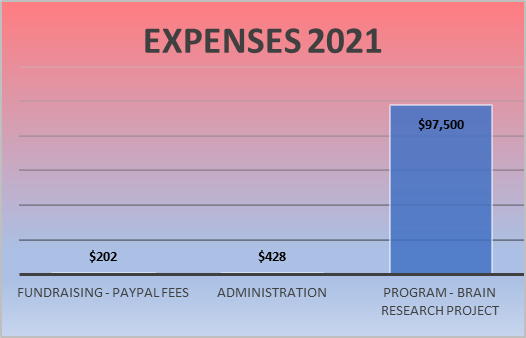 We created an Amazon Smile account in which Amazon will make a donation to NA-USA when shoppers select our nonprofit as the beneficiary. We created an Amazon Smile account in which Amazon will make a donation to NA-USA when shoppers select our nonprofit as the beneficiary.
We continued our presence on Facebook, using it as outreach to patients, families, and caregivers far and wide, and created a caregiver Facebook support group.
Board members contributed articles to the NA News, a publication of the international Advocacy for Neuroacanthocytosis Patients, based in London.
We began publishing the latest neuroacanthocytosis-related research on our website at www.naadvocacyusa.org, allowing patients and families ease of access to the latest advances.
--
A COPY OF THE OFFICIAL REGISTRATION AND FINANCIAL INFORMATION MAY BE OBTAINED FROM THE DIVISION OF CONSUMER SERVICES BY CALLING TOLL-FREE (800-435-7352) WITHIN THE STATE. REGISTRATION DOES NOT IMPLY ENDORSEMENT, APPROVAL, OR RECOMMENDATION BY THE STATE. REGISTRATION #CH62785. 100% OF PROCEEDS BENEFIT THE MISSION OF NEUROACANTHOCYTOSIS ADVOCACY USA, INC.
 |  |
Patient Pen Pals
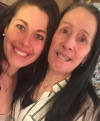 Alex Irvine, an NA patient in London, shares her correspondence with Manon Sauvageu, an NA patient in Canada. Alex Irvine, an NA patient in London, shares her correspondence with Manon Sauvageu, an NA patient in Canada.
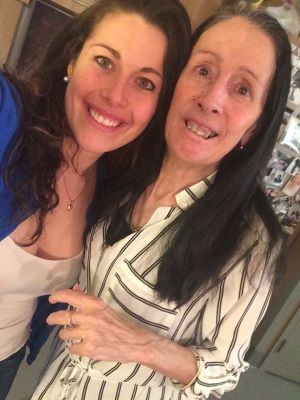 I have been exchanging emails with Manon Sauvageu for the last six or so months -and here are some of the things she has shared with me: I have been exchanging emails with Manon Sauvageu for the last six or so months -and here are some of the things she has shared with me:
Manon is very proud of herself for being able to walk without too much assistance in fact recently with no assistance at all. She puts that down to exercise , exercise and more exercise walking, along the corridors and in the basement of the home where she is staying . She hopes to surprise her neurologist by going to her next appointment without any support.
After getting up in the morning round 8 AM she usually has large breakfast and then goes on to her computer to check her email messages. She is also very happy about her ability to eat after a series of acupuncture treatments which means she can eat anything and everything without choking on it. Then she usually goes for a walk along the cycle routes or the corridors of the residence. At about 3.30 she settles down to watch her favourite TV shows.
After dinner she spends some time in the gym. Her favourite pastimes include playing dominoes and doing word games with people in the Cooke residence. As well as reading she likes to go swimming in the pool nearby. She has really missed this during the current pandemic. She also misses her Saturday visits with her mother who is close by and they usually went to the cinema.
And finally there is her daughter Fannie (pictured left) who is 29 years old with whom she has a very good relationship. Fanny works as a nurse in the north of Quebec. They exchange facebook messages regularly: “She is a pillar I can count on and we take very good care of each other,“ she says. One thing is for certain: Manon is happy where she is and she wouldn’t change her place for anything in the world.
 |  |
Roll Over Beethoven
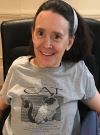 Alex Irvine (right) shares her experience of joining a choir that brings joy to Movement Disorder Patients. Alex Irvine (right) shares her experience of joining a choir that brings joy to Movement Disorder Patients.
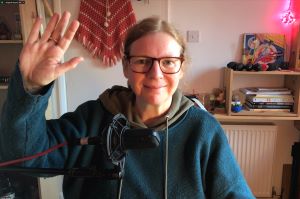 "The Sing for Joy group comes together on zoom every Thursday afternoon at 4pm. It is led by the great talent of Cerys Hogg (right) at the piano who posts the words to familiar and popular songs printed on the screen. A dozen or so of us just sing along while she sings and plays the keyboard. There are a lot of Beatles songs and some oldies but goodies. The humour of the group is great fun; one of the participants uses topical backgrounds to illustrate the composer or the place. What I really enjoy about the choir is that I can sing out as loud as I possibly can." "The Sing for Joy group comes together on zoom every Thursday afternoon at 4pm. It is led by the great talent of Cerys Hogg (right) at the piano who posts the words to familiar and popular songs printed on the screen. A dozen or so of us just sing along while she sings and plays the keyboard. There are a lot of Beatles songs and some oldies but goodies. The humour of the group is great fun; one of the participants uses topical backgrounds to illustrate the composer or the place. What I really enjoy about the choir is that I can sing out as loud as I possibly can."
Cerys has a reputation for delivering entertaining and engaging classes; her classes are stimulating and enjoyable with creativity at the heart. Her singers have these words to say about the choir:
"Our weekly SFJ choir is something we really look forward to, especially during lockdown. It is lovely seeing the same people every week, to ask how they are, and to be able to sing our hearts out for an hour or so, which leaves us feeling uplifted and positive."
“With sing for joy, I learnt how to find my voice and overcome my nerves. Singing with Sing for Joy is fun, educational and a good form of therapy.”
“My voice had become very weak to the extent that it was often reduced to a barely audible squeak. I was prescribed voice therapy which made me aware that without long term voice exercises, I would lose the gains I had made. I joined Sing for Joy. For me, singing is a wonderful voice maintenance tool: thoroughly enjoyable, therapeutic and socially constructive.”
There is growing evidence for the positive effect of music and singing for patients with Movement Disorders, to a degree that cannot be attained by medical intervention. The Joy of music, of singing and of sharing that joy with others, the rhythm and ability to use the voice to express emotion can only be beneficial.
There are growing numbers of choirs across many countries one can join and try out till you find the one that is more suited to the songs you like and your voice. Try a local Huntington’s or Parkinson’s patient group to ask if they may know of a local choir.
 |  |
Aquafit Classes Benefit McLeod Syndrome Patient
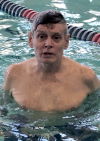 McLeod syndrome patient Mark Williford of Melbourne, Florida finds water aerobics classes to not only be beneficial to his health, but a source of great joy. Mark swam competitively in high school, and swimming has always been an important part of his life. Most weeks Mark heads to the pool for classes at least twice a week. The buoyancy of the water supports a portion of his body weight, making it easier to move in the water, improve flexibility, and strengthen his muscles. McLeod syndrome patient Mark Williford of Melbourne, Florida finds water aerobics classes to not only be beneficial to his health, but a source of great joy. Mark swam competitively in high school, and swimming has always been an important part of his life. Most weeks Mark heads to the pool for classes at least twice a week. The buoyancy of the water supports a portion of his body weight, making it easier to move in the water, improve flexibility, and strengthen his muscles.
Somewhere Down the Lazy River
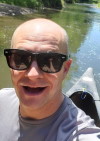 Bob Metzger, a board member of NA-USA and a McLeod syndrome patient, shared these beautiful photos of a recent canoe outing with friends in Minnesota and how he likes to spend his leisure time. Bob Metzger, a board member of NA-USA and a McLeod syndrome patient, shared these beautiful photos of a recent canoe outing with friends in Minnesota and how he likes to spend his leisure time.
We just had to share these photos of Bob "somewhere down the lazy river" with his friends.
|
|
|